Counselor Training and Poverty-Related Competencies: Implications and Recommendations for Counselor Training Programs
Full description
In 2013, nearly 50 million Americans were living at or below the poverty line. Current research reflects that impoverished individuals are 2–3 times more likely to exhibit psychological distress than are their middle and upper class counterparts. Researchers also suggest that individuals living in poverty who seek counseling services often drop out or do not complete treatment for a number of reasons. This paper will explore the multifaceted difficulties impoverished individuals often face when seeking mental health counseling services including both systematic barriers and counselor bias. The authors of this paper posit that a major source in preventing early termination or drop out is to provide the appropriate training for addressing the complexities of poverty in relation to mental health to counselors while in counselor training programs. Two main training methods will be discussed: the CARE model and multicultural training (MCT). The authors will discuss limitations of the current training models, along with implications and recommendations for counselor training programs based on the current literature and supported research findings surrounding the CARE model and MCT.
Comments
to view and add comments.
Annotations
No one has annotated a text with this resource yet.
- typePdf
- created on
- file formatpdf
- file size247 kB
- container titleVISTAS Online
- copyright statusIn Copyright
- creatorCourtney East, Dixie Powers, Tristen Hyatt, Steven Wright, and Viola May
- issue2016
- publisherAmerican Counseling Association
- publisher placeAlexandria, VA
- rights holderAmerican Counseling Association
